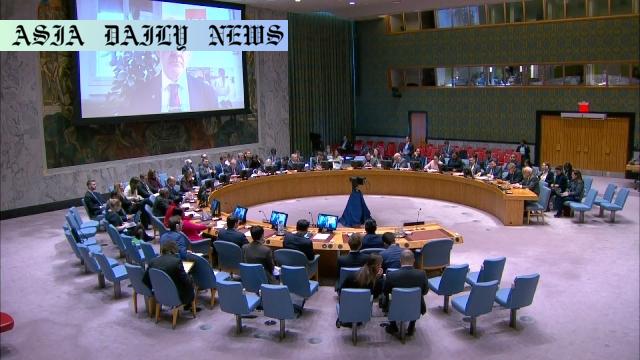UNRWA ban: The US under Trump backs Israel’s law banning the UN agency for Palestinian refugees amidst global disapproval.
- The US under Trump’s administration supports Israel’s ban on UNRWA operations.
- Israel accused some UNRWA staff of aiding Hamas attacks against the state.
- UNRWA Commissioner-General calls the ban ‘disastrous’ for Palestinian refugees.
- The UN Security Council discusses the global impact of Israel’s new law.

The Background of the UNRWA Ban
Israel’s decision to ban the operations of the UN Relief and Works Agency for Palestine Refugees in the Near East (UNRWA) has sparked widespread debates and concerns across the global stage. The UNRWA, established in 1949, primarily focuses on aiding Palestinian refugees in their pursuit of education, healthcare, and basic sustenance. However, recent allegations from Israel have accused some of UNRWA’s staff members of complicity in Hamas’s surprise attacks, further exacerbating tensions in an already fragile region.
Trump Administration’s Support of Israel
The US endorsement of Israel’s decision marks a significant foreign policy shift. Unlike the Biden administration, which previously expressed hesitation over such legislation, the Trump administration has fully supported Israel’s actions. Dorothy Shea, the US deputy representative to the UN, defended the new law, claiming that UNRWA was not indispensable to providing humanitarian aid and accusing the agency of alarmist attitudes. This new stance aligns closely with Trump’s strong pro-Israel policies, reaffirming America’s firm alliance with its longstanding Middle East partner amidst global criticism.
Global Reactions
The global response underscores the polarizing nature of this decision. UNRWA Commissioner-General Philippe Lazzarini labeled the ban as ‘disastrous.’ He emphasized that the implications of this law could devastate Palestinian refugees, cutting off critical avenues of support for healthcare, education, and emergency aid. Most members of the UN Security Council, excluding the United States, voiced their joint support for the continuation of UNRWA’s operations, urging Israel to rethink its practices for the sake of regional stability and humanitarian rights.
The Impact on Palestinian Refugees
For the over 5 million Palestinian refugees relying on UNRWA services, the ban could be a critical turning point. This law might result in displaced children losing access to education, clinics shutting down, and poverty rates climbing rapidly. Dependence on smaller, less-equipped NGOs or other governments for humanitarian aid would increase drastically, potentially hindering the ecosystem of support in the Gaza Strip and the West Bank. Many argue that scrapping UNRWA will leave some of the world’s most vulnerable people in limbo, amid rising geopolitical tensions.
An Uncertain Future for Aid
Alternative plans to provide aid in Gaza and the West Bank remain uncertain. While the US has suggested that UNRWA is not the sole humanitarian provider, a cohesive framework to fill the gap left by the ban has yet to be formally articulated. Critics argue this vacuum will severely destabilize the region and further exacerbate humanitarian crises. Without a viable replacement for UNRWA, the promises of continued aid remain just that—promises.
The Road Ahead
The implications of Israel’s new law and its US-backed implementation expose some of the deep divisions in international relations and humanitarian policy. On one hand, Israel views the ban as a security protocol to address concerns regarding agency staff’s alleged involvement with Hamas. On the other hand, global powers strongly advocate for the continuation of UNRWA’s mission, emphasizing its significance for millions of refugees who have no other reliable source of support. The development signals intensified debate on balancing security interests and global humanitarian obligations, as stakeholders call for diplomacy and negotiated solutions.



Commentary
A Controversial Stance
The Trump administration’s backing of Israel’s decision to ban the UNRWA reflects a deeply contentious issue that straddles diplomacy, humanitarian concerns, and security imperatives. This drastic shift in US policy highlights the administration’s unwavering commitment to Israel, a stance that will undoubtedly draw sharp criticisms from advocates for human rights and refugee aid.
The Role of UNRWA in Palestinian Aid
UNRWA plays an essential role for millions of Palestinian refugees, providing essential services that often act as a lifeline. Its widespread network and experience make it a uniquely equipped agency to handle the burgeoning needs of displaced populations. By banning its operations, Israel risks creating an irreversible humanitarian crisis, and the ripple effects may destabilize the region even further. Regardless of the allegations against some of its staff, dismantling an agency so crucial feels like a blunt approach to solving a nuanced issue.
The Challenges of Redirection
While the US claims alternative options exist to deliver aid, skepticism lingers. Shifting humanitarian responsibilities from a well-functioning organization like UNRWA to ad-hoc or regional arrangements is no easy challenge. This raises questions about the ethics and pragmatism of this decision. Without a solid contingency plan, this move risks worsening the plight of those displaced, compounding political strife in the region.
The Broader Implications
Ultimately, this decision is more than a bilateral agreement between the US and Israel. It encapsulates broader issues involving international sovereignty, the balance of power in global governance, and the prioritization of security at the expense of humanitarian obligations. As debates unfold, one can hope world powers come together to take steps that prioritize people’s livelihoods above political maneuvering.